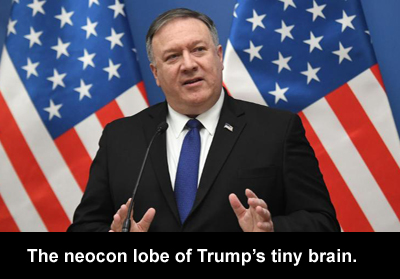Fear and favor.
The Trump Administration almost gleefully declared Iran's Revolutionary Guard a terrorist organization this week, setting a new precedent in this overtly imperial practice of terror designation by applying it to a branch of the armed forces of a sovereign nation. The first question that came to my mind was, did Trump do this at this particular moment as a last-minute favor to Netanyahu or as a sop to his buddy Mohammed bin Salman? Only Trump's hairdresser knows for sure.
Not that the president's penchant for prioritizing his personal interests is the sole motivation here. As the execrable Pompeo said, this is part of their strategy of placing "maximum pressure" on Iran, another step toward making military conflict with the Islamic Republic all but inevitable. Trita Parsi pointed out on Democracy Now! that one of the most serious effects of this decision would be to forestall any future opportunity to reduce the level of confrontation with Iran by effectively criminalizing any contact with large swaths of the Iranian government or civil society. It will also make reconciliation far more politically costly for future, hopefully more sane American leaders, while strengthening the hardliners in Iran. This strikes many as ironic, but it isn't, really - this is similar to what the Bush II administration did with Mohammed Khatami. Republican presidents in particular much prefer hot-headed Iranian leaders like Ahmadinejad because they're easy to demonize. This policy practically guarantees another hot head in Teheran.

The frankly laughable Pompeo took the occasion of his announcement to rattle through a litany of Iran's terroristic offenses over the decades, such as the bombing of the Marine barracks in Lebanon in 1983, carried out by a nascent Hezbollah. Naturally, every action taken by Hezbollah is attributed to Iran, but just to focus on this one example - in 1983, the U.S. was supporting Saddam Hussein in his then 3-year-old invasion of Iran, a conflict that killed upwards of 900,000 Iranians over eight years. Hezbollah had risen in opposition to the invasion of Lebanon by Israel, which was essentially supported by the United States. Say what you like about the bombing, we were not simply minding our own business in those days. Add to that the fact that we worked with British intelligence to bomb a mosque in Lebanon around that time, and then ask ... who's the terrorist?
One thing to remember with the Trump administration: there's the personal venality and self-dealing of Trump himself, and then there's the craven policies of the institutional Republican party. Often those things intersect in toxic ways, and I think this terror designation is one of those instances.
luv u,
jp
Not that the president's penchant for prioritizing his personal interests is the sole motivation here. As the execrable Pompeo said, this is part of their strategy of placing "maximum pressure" on Iran, another step toward making military conflict with the Islamic Republic all but inevitable. Trita Parsi pointed out on Democracy Now! that one of the most serious effects of this decision would be to forestall any future opportunity to reduce the level of confrontation with Iran by effectively criminalizing any contact with large swaths of the Iranian government or civil society. It will also make reconciliation far more politically costly for future, hopefully more sane American leaders, while strengthening the hardliners in Iran. This strikes many as ironic, but it isn't, really - this is similar to what the Bush II administration did with Mohammed Khatami. Republican presidents in particular much prefer hot-headed Iranian leaders like Ahmadinejad because they're easy to demonize. This policy practically guarantees another hot head in Teheran.

The frankly laughable Pompeo took the occasion of his announcement to rattle through a litany of Iran's terroristic offenses over the decades, such as the bombing of the Marine barracks in Lebanon in 1983, carried out by a nascent Hezbollah. Naturally, every action taken by Hezbollah is attributed to Iran, but just to focus on this one example - in 1983, the U.S. was supporting Saddam Hussein in his then 3-year-old invasion of Iran, a conflict that killed upwards of 900,000 Iranians over eight years. Hezbollah had risen in opposition to the invasion of Lebanon by Israel, which was essentially supported by the United States. Say what you like about the bombing, we were not simply minding our own business in those days. Add to that the fact that we worked with British intelligence to bomb a mosque in Lebanon around that time, and then ask ... who's the terrorist?
One thing to remember with the Trump administration: there's the personal venality and self-dealing of Trump himself, and then there's the craven policies of the institutional Republican party. Often those things intersect in toxic ways, and I think this terror designation is one of those instances.
luv u,
jp
Comments